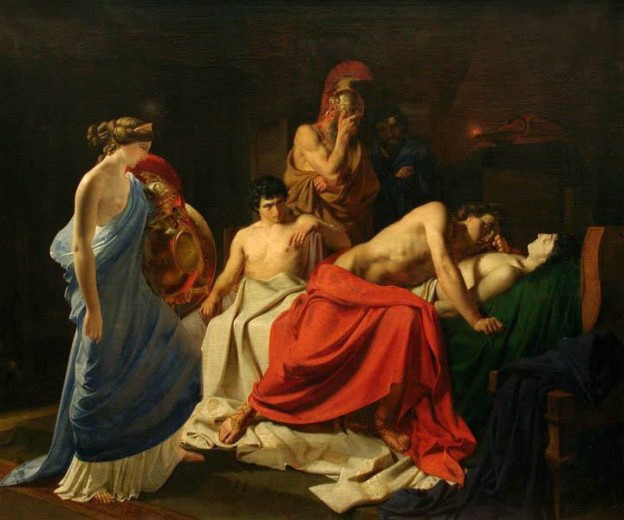In the events of the Trojan War, Patroclus figures as a minor character of small importance. Yes he is a great warrior and yes he is of high command for the Greek’s camp, but in Shakespeare’s Troilus and Cressida, he inhabits the role of the dutiful companion of Achilles and is a comic foil to the rest of the Greek heroes in the camp. Only his death spurs Achilles to become the enraged and aggressive fighter that he is known throughout the land to be.
Patroclus, in the world of the play, is almost always referred to or summoned in conjunction with Achilles, his close friend, confidant, and what some scholars have theorized, his lover. At his first mentioning in the script, Patroclus is characterized by Ulysses, King of Ithaca, and Agamemnon, King of the Greeks and leader of the Greek army, as the man behind Achilles’ languidness and prideful mocking. “The great Achilles… Grows dainty of his worth, and in his tent / Lies mocking our designs: with him Patroclus / upon a lazy bed the livelong day” (1.3.145-150). What Ulysses suggests here is that Achilles and Patroclus share a bed and Achilles has grown soft, effeminate, lacking in motivation, to fight the Trojans as a result of this relationship (“effeminate man,” 3.3.220).
Ulysses further mocks Patroclus and his feminization of Achilles as he describes the manner in which Patroclus acts the role of a ‘player’ in Shakespeare’s time. Known in Shakespeare’s time as ‘players,’ Elizabethan actors were all male actors and routinely had to play women’s roles, as women were not allowed to act on stage because it was thought that it was morally unbecoming of a woman and not a credible profession for a woman in that day and age. Patroclus, ridiculed by Ulysses for his feminine qualities and his emasculation of Achilles, thus would be played by a young boy aged in his teens. His characterization by Ulysses as a “strutting player,” which the Oxford English Dictionary defines strutting as the action of swelling (“And with ridiculous and awkward action”), looking big, flaunting, and swaggering (“thy topless deputation he puts on,” 1.3.151-4), harbors contempt bordering on homophobia for the male lovers. Ulysses is tired and disdainful of the riffing, theatrical aspect that Patroclus uses to ridicule all of the various Greek warriors (“He pageants us… And, like a strutting player, whose conceit / Lies in his hamstring, and doth think it rich / To hear the wooden dialogue and sound / ‘Twixt his stretch’d footing and the scaffold age,—” 1.3.154-9). He sees this as Patroclus distracting Achilles away from battle and as a threat of homosexual desire in this male-dominant theater of war and macho homosocial relationships between warriors. It is a tension created in the camp, that this real love and lasting affection between Achilles and Patroclus is consuming and that the Trojan War is a pointless endeavor.
The player he is, Patroclus is ridiculed and subject to homophobia by the rest of his comrades. Perhaps it is the threat of being able to create a life that is not part of the world of the Trojan War. Or maybe it has something to do with the Greek warriors own fears of being classified as effeminate in their actions, and as a result Ulysses is homophobic towards the affective relationship that Achilles and Patroclus have. Either way, Patroclus and his theatricality and relationship with Achilles are a very interesting and loaded relationship in Shakespeare’s Troilus and Cressida.

